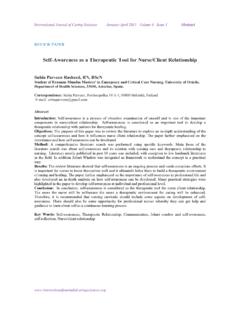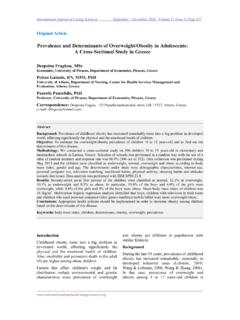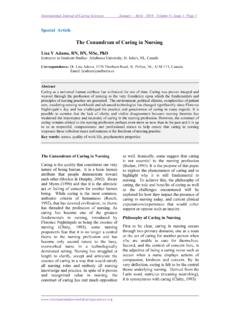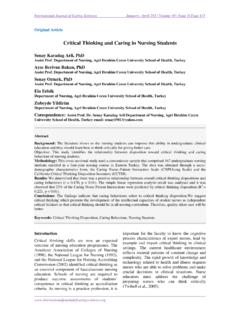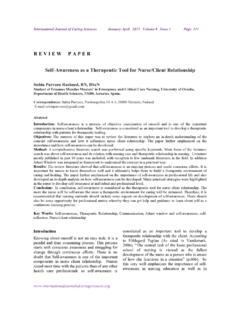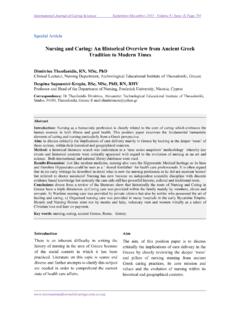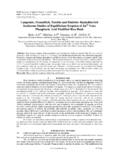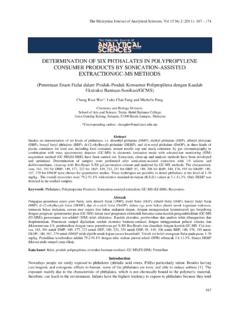Transcription of Status of Caring, Respectful and Compassionate …
1 International Journal of Caring Sciences September-December 2017 Volume 10 | Issue 3| Page 1118 Original Article Status of Caring, Respectful and Compassionate Health Care Practice in Tigrai Regional State: Patients Perspective Haftu Berhe, MSc Mekelle University College of health sciences, Mekelle, Tigray State, Ethiopia Hailemariam Berhe, MSc Mekelle University College of Health Sciences, Mekelle, Tigray State, Ethiopia Alemayehu Bayray, PhD Mekelle University College of Health Sciences, Mekelle, Tigray State, Ethiopia Hagos Godifay, PhD Tigray Regional Health Bureau, Mekelle, Tigray State, Ethiopia Goitom Gigar, MHA Tigray Regional Health Bureau, Mekelle, Tigray State, Ethiopia Gebremedhin Beedemariam, MSc Addis Ababa University, College of Health Sciences, Addis Ababa, Ethiopia Correspondence: Hailemariam Berhe Kahsay, Mekelle University College of Health Sciences, Mekelle, Tigray State, Ethiopia E-mail: Abstract Background.
2 A lot has been done globally, continentally and at national level to improve health Status of the community. Despite the increasing scope and sophistication of healthcare, the huge resources devoted to it and the focus on improvement; it is still failing at a fundamental level. Caring and compassion, the basics of care delivery, and the human aspects that define it seem to be under strain. Objective: To assess the Status of patient centered care in Tigrai Regional state: Patients Perspective Methodology: Cross-sectional study design was employed and the study participants were 1386 patients attending in the selected health facilities in Tigray health institutions. The study participants were selected proportionally from each health facility using systematic random sampling on discharge.
3 Individualized Care Scale tool was used to assess patient s perception and experience on patient centered care. Interviewer administered data collection technique was employed. Epi info 7 was used for data entry and analyzed by SPSS version 20 software. Tables, figures and text were used for data organization and presentation. Results: The mean age of the study participants was (+ ). Majority ( ) of the participants were married by marital Status and were with no formal education. Similar proportion of males and females ( versus ) had good experience towards caring, Respectful and companionate health care practice. Besides, about 70% of participants who were self employed had poor experience and farmers had good experience concerning patient centered care.
4 Males and females had similar level of poor level of perception ( versus ) towards caring, Respectful and Compassionate health care practice. Similarly, those with age less than or equal to and greater than had similar level of good practice ( versus ); on the other hand those who are divorced by marital Status , and had good and poor practice respectively. Conclusion: In this study the experience of patients towards caring, Respectful and Compassionate health care practice was found to be good in 55% of respondents and poor in the rest 45% respondents. Similarly, patients perception towards CRC was assessed and found to be good and poor in 56% and 44% of the respondents respectively. Hence much should be done to improve the practice of CRC through policy & guideline development, continuous Training for all health professionals and Community awareness.
5 Key words: Compassionate , Respectful , Care, Ethiopia International Journal of Caring Sciences September-December 2017 Volume 10 | Issue 3| Page 1119 Introduction Health has been defined in different ways; the medical model defines health as the absence of disease and the presence of high levels of function. WHO defines health as the complete physical, mental, social, spiritual and economic wellbeing not only the absence of disease or infirmity? (Dilon, 2007).The latter definition emphasizes on the importance of providing individualized humanistic care in a holistic approach. Organizing the delivery of health care around the needs of the patient may seem like a simple and obvious approach.
6 In a system as complex as health care, however, little is simple. In fact, thirty years ago when the idea of patient-centered care first emerged as a return to the holistic roots of health care, it was swiftly dismissed by all but the most philosophically progressive providers as trivial, superficial, or unrealistic. It s defining characteristics of partnering with patients and families, of welcoming even encouraging their involvement, and of personalizing care to preserve patients normal routines as much as possible, were widely seen as a threat to the conventions of health care where providers are the experts, family are visitors, and patients are body parts to be fixed.
7 Indeed, for decades, the provision of consumer-focused health care information, opportunities for loved ones involvement in patient care, a healing physical environment, food, spirituality, and so forth have largely been considered expendable when compared to the critical and far more pressing demands of quality and patient safety not to mention maintaining a healthy operating margin (Frampton et al, 2008). A person-centered health system is one that supports people to make informed decisions about, and to successfully manage, their own health and care, able to make informed decisions and choose when to invite others to act on their behalf. This requires healthcare services to work in partnership to deliver care responsive to people s individual abilities, preferences, lifestyles and goals (Debra de S, 2014).
8 The Key components of person-centred care include compassion, dignity and respect. These may be demonstrated via shared decision making, supporting self-management and proactive communication (Debra de S,2014). Compassion or feeling empathic concern and acting to ameliorate concerns, pain, distress and suffering is fundamental to healthcare; it defines the higher purpose of our healthcare system and humanity behind the bottom line. It challenges all of us, providers and patients alike, to listen deeply to each other, to value each other s experiences and expertise, and to build effective relationships in which empathy is generously expressed among all participants.
9 Compassion focuses on the recognition of the uniqueness of another individual, and the willingness to enter into a relationship in which not only the knowledge but the intuitions, strengths, and emotions of both the patient and the health care professional can be fully engaged (Lowenstein 2008). A simpler definition is that it is a deep awareness of the suffering of another coupled with the wish to relieve it (Chochinov, 2007). Respect for persons is frequently used synonymously with autonomy. However, it goes beyond accepting the notion or attitude that people have autonomous choice, to treating others in such a way that enables them to make the choice.
10 Respecting the patient s right to self-determination that is, supporting decisions that reflect the patient s personal beliefs, values, and interests problems (Brunner & Suddarth , 2010). A lot has been done globally, continentally and at national level to improve health Status of the community. Despite the increasing scope and sophistication of healthcare, the huge resources devoted to it and the focus on improvement; it is still failing at a fundamental level. Caring and compassion, the basics of care delivery, and the human aspects that define it seem to be under strain. The roles of caring, comfort and compassion have been replaced with a critical focus on pathways, tasks and documentation though it is paramount important and indispensable (Smiley ,2001).
